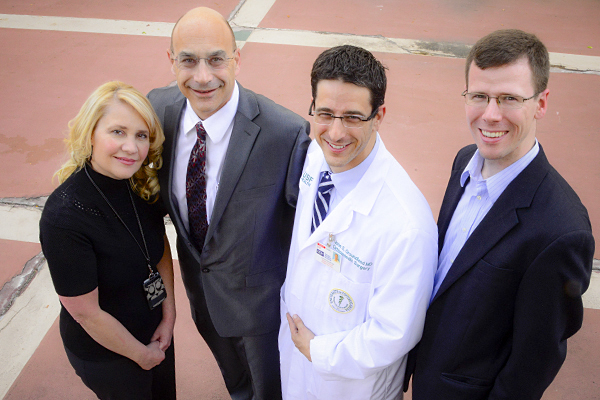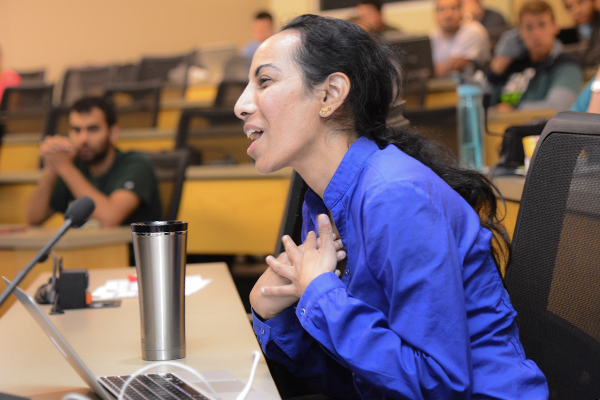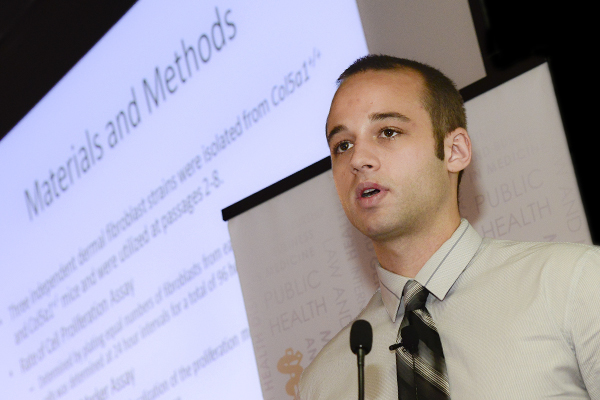Taking active roles in scholarly activities beyond the assigned curriculum will very likely give medical students a decided advantage when applying for residency programs and fellowships and even in the rest of their careers.
That was the central message for this year’s group of presenters in the USF Health Morsani College of Medicine Scholarly Concentrations Program Student Symposium, held Oct. 18. The 4th annual symposium featured 21 presentations by medical students participating in the faculty-mentored Scholarly Concentration Program.
The symposium is a trial run, of sorts, for the mostly second-year medical students to present their preliminary research data. Their projects will likely become their capstone project that culminates their work in their fourth year.
Called “The Real Next Steps: The Importance of Scholarship, Community Service, Research and Intellectual Curiosity in the Practice of Medicine,” the symposium began with several speakers sharing their experiences and offering realistic advice for ways the students could improve their impact on the field of medicine, help propel themselves in their careers, and lead them to a more satisfying career.

This year’s physician panel included, from left. Drs. Theresa Zesiewicz, Steven Goldin, John Groundland, and Thure Caire.
“Scholarly work will help each of you build the foundation you will need for the rest of your years, with no short cuts,” said Steven Goldin, MD, PhD, professor of surgery in the USF Health Morsani College of Medicine.
Dr. Goldin was one of four physicians who spoke before the student presentations. He stressed the need to stay diligent in their work and to not expect it to be easy, but that it will be satisfying.
John Groundland, MD, USF medical school alum and orthopaedic oncology surgeon at USF, advised students to look for mentors who will take an active part in your education.
M. Thure Caire, MD, USF medical school alum and a gastrointestinal fellow at USF, reminded students to be open to working with other people within their class and that it’s best to be collaborative in your work.
And Theresa Zesiewicz, MD, professor of neurology, director of the USF Ataxia Research Center, and director of Clinical Research for the USF Parkinson’s Research Foundation Center of Excellence, urged students to not be afraid of researching orphan diseases, that research will form the basis of the rest of their careers, and to surround themselves with great people.
After the panel speakers, students presented their work. Topics included the mechanics of disease, community involvement, politics and culture of Western medicine, health issues in poor communities, and medical education. Students and their topics included the following:
Katelyn Chitwood, MSIV: “Topical and Intralesional Treatment of Nonmelanoma Skin Cancer: Efficacy and Cost Comparisons”
John DeNigris, MSII: “Altered Dermal Fibroblast Behavior in a Collagen V Haploinsufficient Model of Classic Type Ehlers Danlos Syndrome”
Nikki Freedman, MSII: “Cultural Awareness in Medicine: Exploring the Use of Art and Tradition in Healing Practices utilized by Native American Populations and Applying Concepts in Art Therapy to Care for the Ill”
Cheryl Godcharles, MSII, and Kathleen Pombier, MSII: “ESTEEM: Empowering Survivors of Intimate Partner Violence Through Educational Experiences in Medicine”
Chelsea Gorsline, MSII: “Water, Sanitation and Hygiene in Cedro Galán, Nicaragua”
Candace L. Haddox, MSIII, and Shreya Narayanan, MSII: “Nutrition Education: A Curriculum to Increase Nutrition Competency Among Medical Students”
Mikaela Jayashekaramurthy, MSIV: “Improving Hand Hygiene: A Quality Initiative for Anesthesia Providers”
Michael Kongnyuy MSIII: “Penile Sparing Treatment Options For Select Primary Penile Tumors”
Jonathan Koscso, MSII, and Monique Konstantinovic, MSII: “Race 4 Her Life: Fighting Ovarian Cancer”
Danielle Kurant, MSIV: “From Diagnosis to Death – The Completed Capstone Project”
James Mauro, MSII: “Proteases in MHCII Epitope Processing: A Bioinformatics Approach”
Eric Monaco, MSII: “A Health Needs Assessment of the Resource-poor Community of Cedro Galán in Nicaragua”
Jacob Pierce, MSII: “Examination of the Factors Influencing Collaboration and Efficiency of Academic Research”
Kathryn L. Rodriguez, MSII: “Effect of Pulmonary Function Tests on Peri-Operative Outcomes after Robotic-Assisted Pulmonary Lobectomy: Retrospective Analysis of 234 Consecutive Cases”
Elizabeth Rogers, MSII: “Impact of Lupus on Lipid Handling in THP-1 Human Macrophages”
Charles Schutt, MSII: “Anatomy and Physiology: A Curriculum to Increase Medical Competency of URM High School Students and Promote Medicine as a Possible Career Option”
Cindy Soto Shavor, MSII: “DNA Repair Capacity in Breast Cancer in a Puerto Rican Population”
Madeline Snyder MSIII: “Evaluating Handwriting as an Early Biomarker of Parkinson’s Disease”
Christian Thomas, MSII: “Gene Patents and the Future of Medicine”
Miqi Wang, MSII: “Effects of Local Anesthetics on Differentiation Potential of Human Mesenchymal Stem Cells”
Bailee Williams-Olliff, MSII: “The Art of Community Engagement”
Started in 2007, the Scholarly Concentration Program provides medical students with an elective minor, of sorts, in one of 10 areas, providing them with opportunities for academic endeavors in areas of special interest. The concentrations are: Innovation, Entrepreneurship and Business in Medicine; Health Disparities; Health Systems Engineering; International Medicine; Law and Medicine; Medical Education; Medical Humanities; Medicine and Gender; Public Health; and Research.
Each concentration includes elements of course work, practical application, and scholarly presentation and allows for self-directed learning, enhances interactions between students and fosters relationships between students and faculty.
Story by Sarah Worth, photos by Eric Younghans, USF Health Office of Communications.




